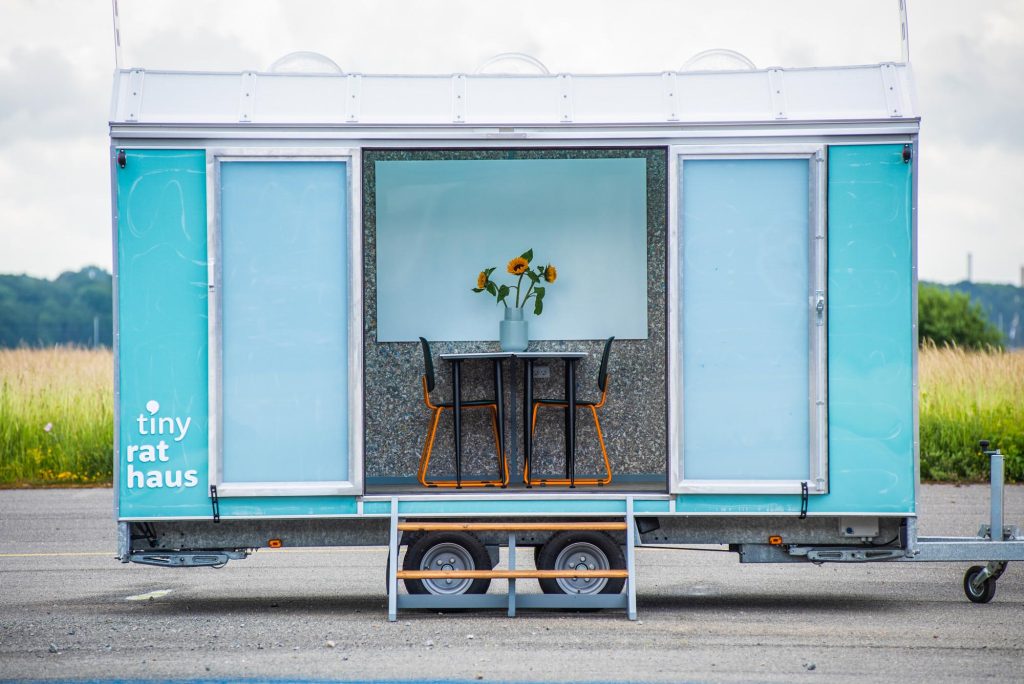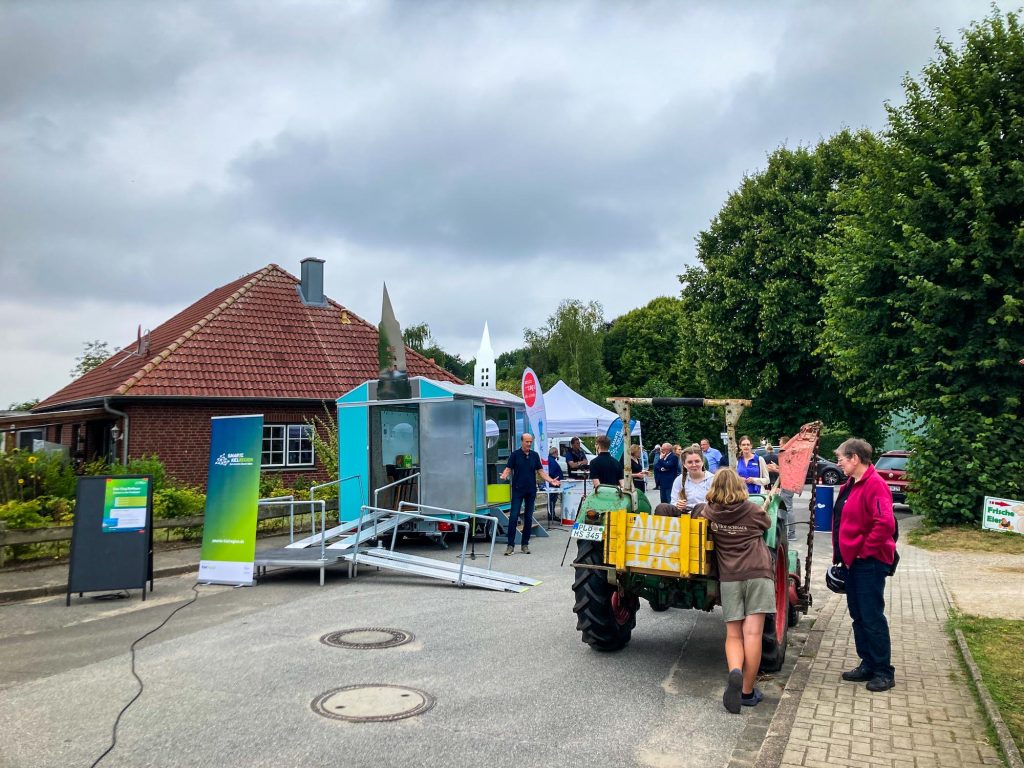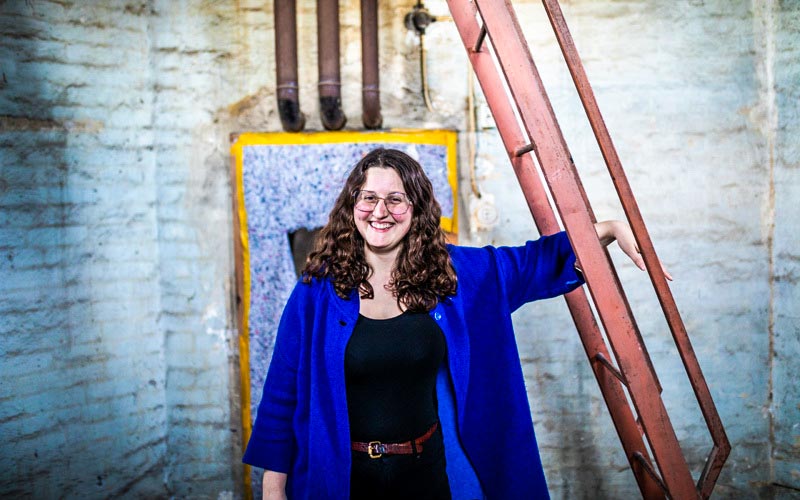Being heard makes us feel valued and identifies priorities for change, but municipalities struggle to do it well. CityChanger and creative Sophie Mirpourian tells us how her idea to use a portable townhall – the Tiny Rathaus – opened a productive dialogue between administration and citizens, and why sometimes being wrong is the right way to go.
In Kiel, a modest sized city in Germany, artists, designers, and NGOs gather at Anscharcampus, a creative community where they experiment with and incubate ideas intended to revitalise the local urban environment.
Team leader, Sophie Mirpourian appreciates first-hand the chances this collective creates for everyday citizens to influence their city. Having grown up in a multicultural household, she is used to not quite adhering to social norms.
“Other people tell you, ‘That’s not how you should do it. There’s a proper way of doing it’”. And so, usually only those in the know have agency to enact change – or keep things the way they are.
Outdated attitudes exacerbate the problem: “I’m a woman, I’m young, so they keep telling me what to do.”
It’s toxic. But this experience afforded Sophie the knowledge that everyone has a voice worth hearing. The city just needed help learning how to listen. Her answer was Tiny Rathaus.
Kiel’s Mobile Town Hall
Sophie pitched the idea of putting the city administration on wheels in 2019, not expecting to get taken seriously. Maybe it was the mention of it being “instagrammable” that swayed the municipality to agree.
Up until its premiere proper in 2022, Sophie partnered with the city to co-produce a prototype, working with officials to plot out the idea, create a route map, and define a SWOT analysis.
Together, they took the Tiny Rathaus on the road for “a test week, with a mobile office and invited city employees and citizens to come and give their feedback”. People were confused but interested.
“I met so many people, and it was very clear we normally wouldn’t have had this conversation” Sophie recalls. “When you take a moment to listen to them, you actually find out what they care about, what is important in their lives.”
As a trained social anthropologist, Sophie is concerned with how humans create and maintain meaning and connections to each other.
Everyday people, it turns out, have ideas for improving their city and they know what needs to change. Creating a space unhampered by administrative framework, and where we can show a stranger that we really listen, she adds, is like “magic”.
Initial success prompted them to create a purpose-built structure.

But listening is a two-way street. Citizens have a responsibility to listen too.
Returning Recognition
Reframing the story from a ‘hero narrative’ of a few people behind every decision to democratising the process empowers people and informs better decision-making. It also shifts recognition from leaders to an ecosystem of contributors.
“Every complex problem is being solved by at least 50 people.”
A big part of being heard is getting recognition for what you do. Interactions facilitated by the Tiny Rathaus allow multiple stakeholders to engage and encourage each other.
Sophie tells us of a conversation she had with a city employee who created a risk analysis for the entire Kiel administration, to which they applied ratings for the likelihood and severity of accidents. It defied Sophie’s expectations: construction workers – exposed to the elements, heavy machinery, heights, and physical labour – weren’t the most in danger; day care workers topped the table for being the most likely to get harmed on duty.
Without this free-thinking number cruncher, we’d have no idea.
Sophie has seen public sector workers become more courageous with their ideas when they feel their creativity has meaning. She drew a conclusion: we should voice our appreciation for what people do every day to maintain our cities, especially those coming up with creative solutions. “It’s weird how little we talk about the things that work. Try giving a compliment to the lady across the desk or even write a love letter to your city administration!”
Professional Rookie
If Sophie’s experience with the mobile town hall has taught her one valuable lesson, it’s this: the more you know, the more you know you don’t know.
Our CityChanger coined the phrase “professional rookie” in recognition that a job title and specific work attire don’t necessarily mean someone has all the right answers.
“Being a professional rookie just means that you know you don’t know how things work.”
Throwing off those preconceptions of ultimate knowledge makes us more open minded, susceptible to the vantage points of others, and better listeners. “It’s liberating!”, she confesses. And being better listeners helps us create cities that people connect with.
Lessons Learned
As a ‘professional’ rookie, Sophie has gathered a lot of knowledge along the way. But she is aware there’s always room to improve. That’s why she attended Urban Future 22, in the hope to discover ideas that worked elsewhere, that Kiel she could replicate. She adds somewhat tongue in cheek: “Steal all the ideas you can get!”
These are the other top tips Sophie shares based on her own experiences:
Don’t Fear Failure
Of course, every idea must be tailored to the needs of each city. Sophie suggests the best way to find out what works is to just do something – even if it’s completely wrong.
“Don’t be too obsessed with the idea. The idea doesn’t matter. What matters is that you get going and you start developing.” It’s easier to improve what doesn’t work than carry on trying to develop the perfect project from scratch – you never will!
Give Up… Just Not Completely
She refers to the term “creative hopelessness” – the brick wall of frustration we hit when we’re so fed up with an idea failing. “Just for a brief moment, give up and see what happens.”
In the creative process, quitting frees up headspace for new ideas to flourish. These can set the project back on track and may even take you in a new, more fulfilling direction.
Welcome Negative Feedback – It Shows People Care
It takes a thick skin to press ahead with an idea knowing it will go wrong and that backlash will follow. But this feedback is much more valuable than opinions voiced at endless consultation events for an idea that’s not yet off the ground.
“People will knock at your door and tell you, ‘This is not good enough’,” says Sophie. Shock them by suggesting you work together on an answer. It makes them feel heard.
This happened with Tiny Rathaus. The prototype lacked a wheelchair ramp – the narrow size of the structure made it difficult to add inclusive access. People were understandably angry.
“It was really uncomfortable having people so angry with you. And it really felt like a failure.” This was positive energy, though; it identified what citizens wanted most from the project.

Be Flexible in Words and Deeds
Finally, as a CityChanger, you too can make sure you’re heard by carefully selecting your language.
“It’s about working with the people you fear the most,” Sophie admits, because those with different perspectives challenge, reshape, and hone what you’re working on.
Before presenting a new idea, Sophie advises, do your homework. “See what their strategic goal is. Find out their pain points.” Appeal to their needs.
Research their departmental website and publications. Mirror the language they use. (It’s the same method we use to build a connection when writing a job application.)
“You should use those words,” our CityChanger advises. “Don’t be too caught up in if this really describes your project.” From their perception, it does.
“Sometimes settle for a word you’re not 100% happy with because the most important thing is that the city administration can put you into a box that makes sense to them.”
Compromise. Get the project started. If you’re listening correctly, it’s likely to evolve and improve beyond anyone expectations anyway.


